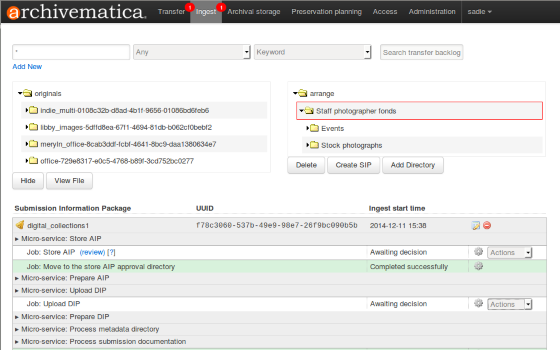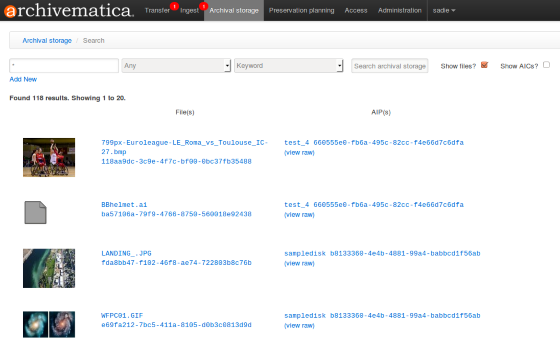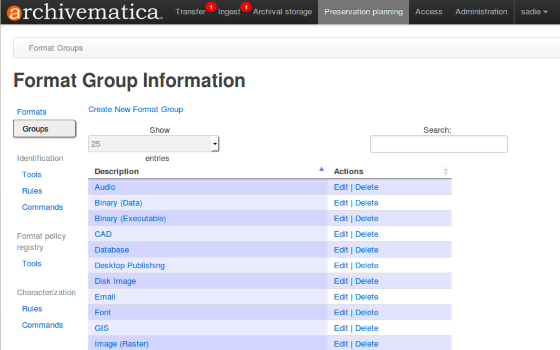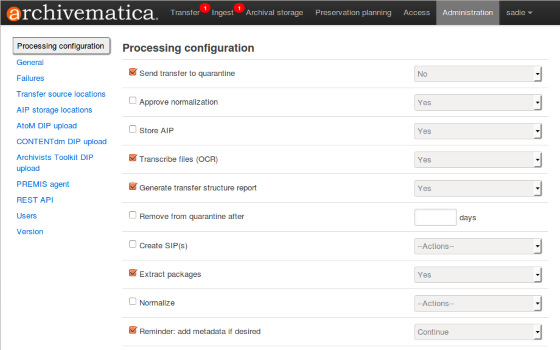Standards-based
Archivematica is an integrated suite of open-source software tools that allows users to process digital objects from ingest to access in compliance with the ISO-OAIS functional model. Users monitor and control ingest and preservation micro-services via a web-based dashboard. Archivematica uses METS, PREMIS, Dublin Core, the Library of Congress BagIt specification and other recognized standards to generate trustworthy, authentic, reliable and system-independent Archival Information Packages (AIPs) for storage in your preferred repository.
Open Source
All Archivematica code is released under a GNU Affero General Public License (A-GPL 3.0) – giving you the freedom to study, modify, improve, and distribute it. We believe that an important part of preservation is transparency, and that memory institutions should be able to demonstrate at every stage what happens when they process cultural heritage materials for preservation. Archivematica code is always freely available, and our documentation is also released under a Creative Commons Share-alike license.
Check out our code repositoriesFlexible and customizable
Archivematica provides several decision points that give the user control over choices about format identification tools, printing the original order of the directories ingested, examining contents for private and personal information, extracting contents of packages and forensic images, transcribing content, and more. Users may also preconfigure most of these options for seamless ingest to archival storage and access. Archivematica offers many ingest workflows: metadata and submission documentation import, zipped and unzipped Bag ingest, digital forensic image processing, SIP arrangement, manual normalization, and dataset management.
Compatible with hundreds of formats
In the Format Policy Registry (FPR), Archivematica implements its default format policies based on an analysis of the significant characteristics of file formats. The FPR also offers an editable, flexible framework for format identification, package extraction, transcription and normalization for preservation and access. Your institution can update tools, rules and commands in your local FPR from the Artefactual-managed FPR server. You can also add your own, local policies to your internal FPR. The FPR is integrated with PRONOM.
Learn more about the FPR serviceAdvanced search and storage management
You can easily search your backlog and your archival storage from within your Archivematica web-based dashboard. This means you can download stored AIPs as complete packages, individual objects, or every package in an AIC. You can also manage your storage and processing locations using the Archivematica Storage Service, including a two-step deletion process that requires justification and approval to eliminate a stored AIP.
Learn more about the storage serviceIntegrated with third-party systems
Memory institutions have dedicated voluminous resources over the past couple of decades to implement various software platforms to manage digital objects. For this reason, we believe in leveraging the strength of other tools and integrating with them wherever possible.
- dSpace
- CONTENTdm
- Islandora
- LOCKSS
- AtoM
- DuraCloud
- OpenStack
- Archivists' Toolkit
- Arkivum
- ArchivesSpace
Active community
The Archivematica community is supported using a lively discussion list, user group meetings, training and workshops, and installation and service agreements provided by Artefactual Systems, Inc. Artefactual systems analysts are active contributors to research and conferences where digital preservation challenges are being addressed. Community members can monitor Archivematica’s evolution on the development roadmap. Artefactual Systems has partnerships that allow us to provide Archivematica as a hosted service, as well.
Constantly improving
Archivematica is an active, dynamic open-source project with a broad user base. We're constantly working with our community to improve the application, and all enhancements are bundled into our public releases. This means that whenever one person or institution contributes resources, the entire community benefits. Find out more about how you can help improve Archivematica.






